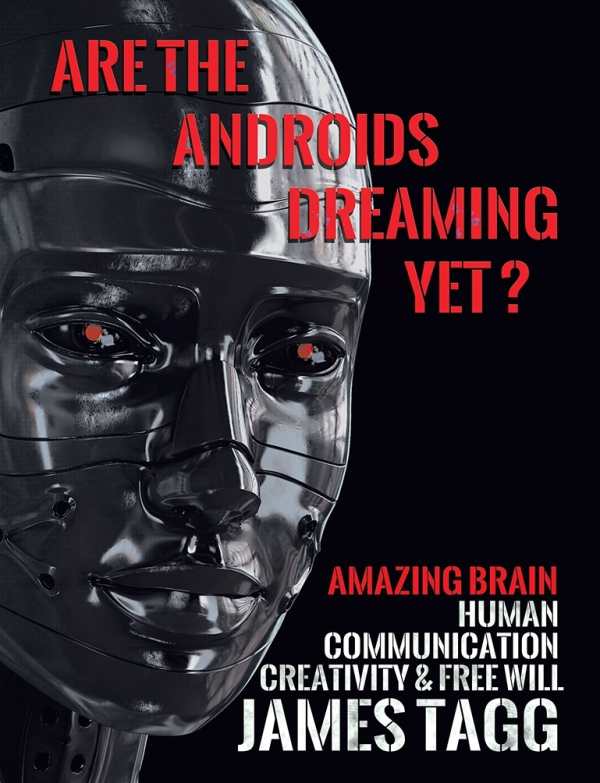Are the Androids Dreaming Yet?
Amazing Brain. Human Communication, Creativity and Free Will
Are the Androids Dreaming Yet? should not be missed. This is one piece of popular science that has “classroom” written all over it.
In this hefty examination of creativity, free will, and the meaning of humanity, engineer James Tagg discusses the similarities and differences between humans and computers. In exploring the possibility that computers will one day match or exceed human mental capabilities, Are the Androids Dreaming Yet? provides a whirlwind tour of philosophy, computing, logic, and communication.
As computers progress in power and ability, doomsayers increasingly suggest that the future is one ruled, directly or otherwise, by advanced machines. Tagg doesn’t consider the issue quite so cut-and-dried. To examine the subject, he explores the tiniest details of the brain, where the phenomenon of consciousness may be based on the presence of quantum effects; he also explores the structure of the universe, which, incredibly, may be based on the same phenomenon. Does this lead us to determinism? And if so, does that mean that we humans are merely advanced computers, replicable and explainable, with no free will beyond a set number of responses to stimuli?
Are the Androids Dreaming Yet? is primarily a philosophical text. However, the hard science from which it draws its conclusions is timely and relevant, as easily relatable as a smartphone and just as tangible. It can be hard to care much about the philosophy of the human mind when so little is known about the brain, but when presented in relation to our computers, we humans shine as creative marvels and engineering wonders. The mystery of freedom of choice doesn’t seem vague, but rather rooted in a scientific tradition that approaches, breakthrough by breakthrough, the true nature of the universe itself. It’s an exciting and fascinating read for a technologically-minded person, and will open the eyes of anyone else. The past one hundred years have been alive with invention, and Are the Androids Dreaming Yet? casts this as not only important for its own sake, but also crucial to our understanding of ourselves.
In a conversational, almost casual tone, the book presents the history of computers and computing in such a way that almost anyone will find it accessible. Tagg frequently interjects anecdotes from his life, making him a relatable and likable author. The back matter presents enough material, including a bibliography and an index of theorems, that this book would not be out of place in a course syllabus.
The author makes multimedia available, which is the book’s only serious weakness. Reading this book in a print format will likely result in the urge to depart to the Internet to look up Tagg’s point, thus breaking up the reading experience, as well as the reader’s attention—so sticking to the electronic version, where readers can interact with it, is recommended, creating a unique reading experience that is well worth the price.
Are the Androids Dreaming Yet? should not be missed. Computing experts, philosophers, ethicists, and physicists alike should take notice, especially if they teach at a university or college. This is one piece of popular science that has “classroom” written all over it.
Reviewed by
Anna Call
Disclosure: This article is not an endorsement, but a review. The publisher of this book provided free copies of the book and paid a small fee to have their book reviewed by a professional reviewer. Foreword Reviews and Clarion Reviews make no guarantee that the publisher will receive a positive review. Foreword Magazine, Inc. is disclosing this in accordance with the Federal Trade Commission’s 16 CFR, Part 255.

